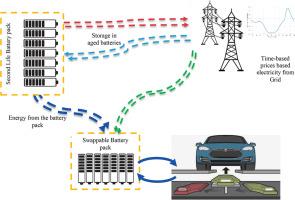The economic value of hybrid battery swapping stations with second life of batteries
Abstract
Battery Swapping Stations (BSS) can prove to be an integral part of the electric vehicle charging infrastructure and provide an alternative solution to the issue of range anxiety and long queuing times to charge the battery. Along with this, the increase in renewable integration in the grid as well as an increase in the number of discarded electric vehicle batteries offer another opportunity for infrastructure design while considering demand response services. In this paper, techno-economic feasibility of BSS considering the impact on electricity prices due to increased solar photovoltaics integration is analysed. An operational algorithm considering time of use tariff and estimated battery demand is designed to schedule battery charging in the battery swapping station with the objective of minimising the total charging cost. Four scenarios considering uncontrolled charging, smart charging, batteries discharging to the grid and second life batteries are designed and analysed. The results indicate that the charging cost reduces at least by 24% with smart charging and by 30% with battery to grid services. It is observed that the total charging cost can reduce further up to 19% while considering second life of batteries for storage. The study indicates the potential of novel business models in electrification of transportation, which can lead to increased opportunity for transition to sustainable transportation for developing nations.


 求助内容:
求助内容: 应助结果提醒方式:
应助结果提醒方式:


